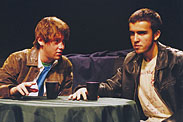McCord thinks of the children
If the children are the future, then the future ain't what it used to be. Don't take our word for it — check out the "Growing Up in Montreal" exhibit at the McCord Museum. Starting at the turn of the century — that would be the 19th and 20th centuries — through a child's eyes, the display takes in all those sepia-toned memories of life before television and Britney Spears. (Of course, it was also before much of the innovations of modern medicine.)

McCord Museum
This 4,000-square-foot exhibition is set in hand-drawn streetscapes of a child's world, in bubblegum shades of blue, pink, green and orange. Two cartoon guides — Louise, age 10, and Paul, age four — "accompany" visitors on their imaginary walk through the city and through time.
There are over 400 artifacts on display — furniture, clothes and toys — including a teddy bear that "became sick and died" in 1914 and was buried by its grieving young owner in the backyard of his home on Peel Street; the bear was dug up a year later and, surprisingly, looks none the worse for wear. Children's fashions from the 1900s to the '60s are on display in a giant chest of drawers.
The Montreal of a century ago was a place of rapid change. Families flowed into the city looking for industrial jobs.
The exhibit doesn't shy away from the darker themes of being young and vulnerable in Montreal (at one point the infant mortality rate saw one in every four babies die before their first birthday), and issues like the population exodus to the suburbs are explained as well.
According to Executive Director Victoria Dickenson, "the joy of 'Growing Up in Montreal' is the way it transcends generations, evoking memories and sparking discussions between parents, grandparents and children of all ages about what it was like 'back then' and how things are different today." Still, she adds, "it also makes us think critically about how children have had an impact on the home and the city itself, and reminds us that in many ways the world is now a safer place for children, even as new threats and challenges loom."
Visitors are encouraged to write a postcard with their own recollections of growing up in Montreal, and many of these are as entertaining and informative as the artifacts — one Montrealer remembers the days of being able to play hopscotch on Dr. Penfield Ave., and paying a few cents to be entertained by an organ grinder.
"Growing Up in Montreal," McCord Museum, until September 5, 2005. $10 for adults, $20 for families, $7.50 for seniors, $5.50 for students and $3 for children between the ages of 6 and 12.
Can't lose with Zadie's Shoes
You don't usually expect to get hot tips for the track from the synagogue. On the other hand, if you've, errr, "misplaced" the money your girlfriend was going to use for a trip to Mexico, you may be willing to take your chances.

Adam Goldhamer as Benjamin and Nicolae Rusan as Bear
Benjamin Feldman
This is the world of Zadie's Shoes, a play written by Adam Pettle at the National Theatre School here in Montreal, which will be the McGill Department of English's first production of the year.
Zadie's Shoes tells the story of Benjamin, a compulsive gambler who has just lost the money for his girlfriend Ruth's trip to Mexico — a trip she was taking to get treatment for cancer.
He has 72 hours to find the cash, and his options are running out. In desperation, Benjamin finds himself in a synagogue, where he meets a prophet named Eli who gives him rabbinical advice, and a hot tip on a racehorse.
"I actually worked on the play when it was being written; I was blown away by the script," said Professor Myrna Wyatt Selkirk, who will be directing the production.
"I was fascinated to see how people continue to live their lives through all this chaos. I knew it, but it's something else to see it on stage like this."
Performances begin at 8 pm, Wednesday, November 10, to Saturday, November 13, and Thursday, November 18, to Saturday, November 20, at Moyse Hall. Admission: $10 for adults, and $5 for students, seniors, and groups. Ticket hotline: 398-6070.
Centraide specials
As the days get shorter and the temperature starts to drop below freezing, doesn't the idea of a Caribbean cruise sound enticing? Well, on November 18 you can drop by the Bronfman Building and pick one up — assuming, of course, that you put in the highest bid.
If you don't, never fear. The Fourth Annual Silent Auction has plenty of other items to warm the soul and feed the belly. The Centraide fundraiser has a number of high quality items to bid on, donated by the McGill community and outside businesses.
The Silent Auction is the biggest money raiser for McGill's Centraide campaign, bringing in more than $6,000 last year. With the Caribbean cruise having a reserve of $3,499, this year's event could top that by quite a margin.
"It's an effort with a number of volunteers who put in their time, energies and talents," said Silent Auction coordinator Lorrie Quigg, career consultant for the Faculty of Management.
The hefty price tag on the cruise shouldn't scare off bidders on a budget. Ski weekends, nights in the Hilton and dinners at local restaurants are all available, not to mention books, car rentals and other useful fare.
The Silent Auction will be held from 4 to 6 pm on the sixth floor of the Bronfman Building on November 18. Cash and cheques accepted. See www.mcgill.ca/centraide/events04/upevents/ for more information.
Also, on November 25, Centraide (and McGill tastebuds) will benefit from the Third Annual Finger Food Fundraiser. The two-hour event, which starts at noon on the sixth floor of the Bronfman Building, is sponsored by the Department of Develop-ment and Alumni Relations, and will bring you a cornucopia of gastronomic delights from some of Montreal's finest caterers, hotels and restaurants. Space is limited, so reserve your ticket at 398-3571. $10.
Educating Quebec
Bill 60 was a landmark legislation of Premier Jean Lesage's government in 1964. With Quebec society in the throes of the Quiet Revolution, the time was ripe for an overhaul of the church-dominated education system. The reforms were dramatic — building on the Parent Commission's report, Quebec instituted a series of reforms that created 55 Catholic and nine Protestant school boards out of a complicated patchwork of parish-based schools. With this reform came the provincial education ministry, and, in 1966, the CEGEP system. Two years later, the Université du Québec was founded.

Tzigane
The Quebec Studies Program — the precursor of which was founded only a year before Bill 60 — is marking the 40th anniversary of the legislation with a one-day conference on November 18. Speakers include Pierre Lucier, the deputy minister of education; McGill's vice-principal of inter-institutional affairs, Janyne Hodder; and Monique Laurin, director of College Lionel-Groulx.
Part of the mission of the reforms contained in Bill 60 was to incorporate Quebec values into the education system. Much of the roundtable discussions of the conference will address how successful those reforms have been, and where Quebec's education policy should go in the future.
"What Role Must or Can the Quebec State Play in Education?" November 18, 8:30 am to 7 pm, reservation required; for more information call, 398-3960.
The body's mind
Ever wonder how it is that you wake up on a Monday morning only to discover that you had somehow your snooze alarm a dozen times without realizing it? Daniel Dennett knows why: your body has a mind of its own.

Daniel Dennett
It's possible this isn't news to you, but it's reassuring to hear it from Dennett, the Austin B. Fletcher Professor of Philosophy, and director of the Center for Cognitive Studies at Tufts University. Dennett will be giving the Montreal Neurological Institute's Wilder Penfield Lecture, entitled "My Body Has a Mind of its Own."
His talk will be about how we make the transition from unconscious cognitive (or control) competences in the brain to consciousness. He'll address why some sorts of brain activities involve consciousness, when at first it seems that none of them need it, and examine what extra competences a body gets when there is a conscious mind "in the driver's seat."
Dennett is the author of several books, including Freedom Evolves and Darwin's Dangerous Idea. He has also written over 200 scholarly articles on various aspects on the mind, published in journals ranging from Artificial Intelligence and Behavioral and Brain Sciences to Poetics Today and the Journal of Aesthetics and Art Criticism.
"My Body Has a Mind of its Own," November 18, 4 pm, Montreal Neurological Institute and Hospital, Jeanne Timmins Amphitheatre.
